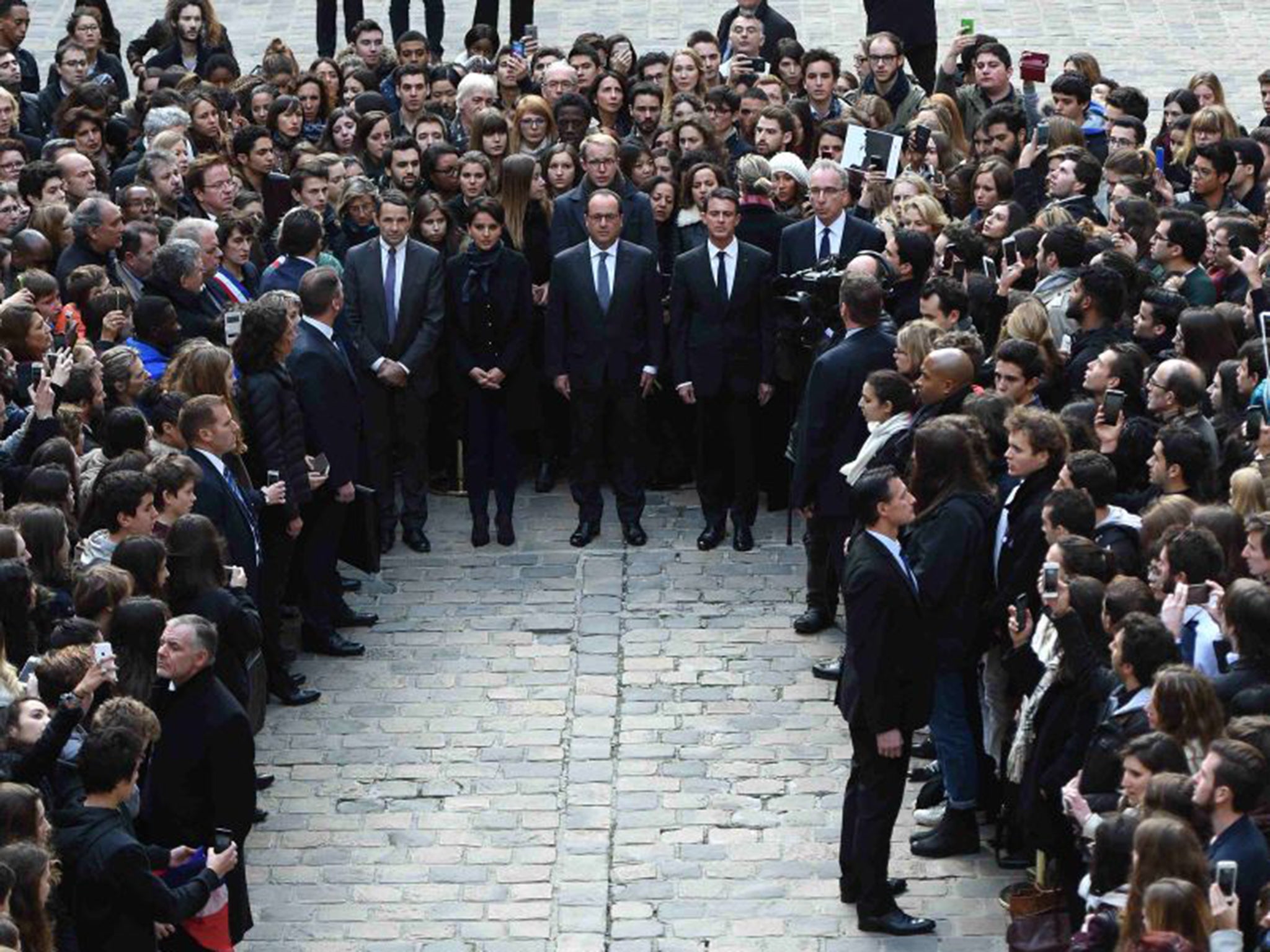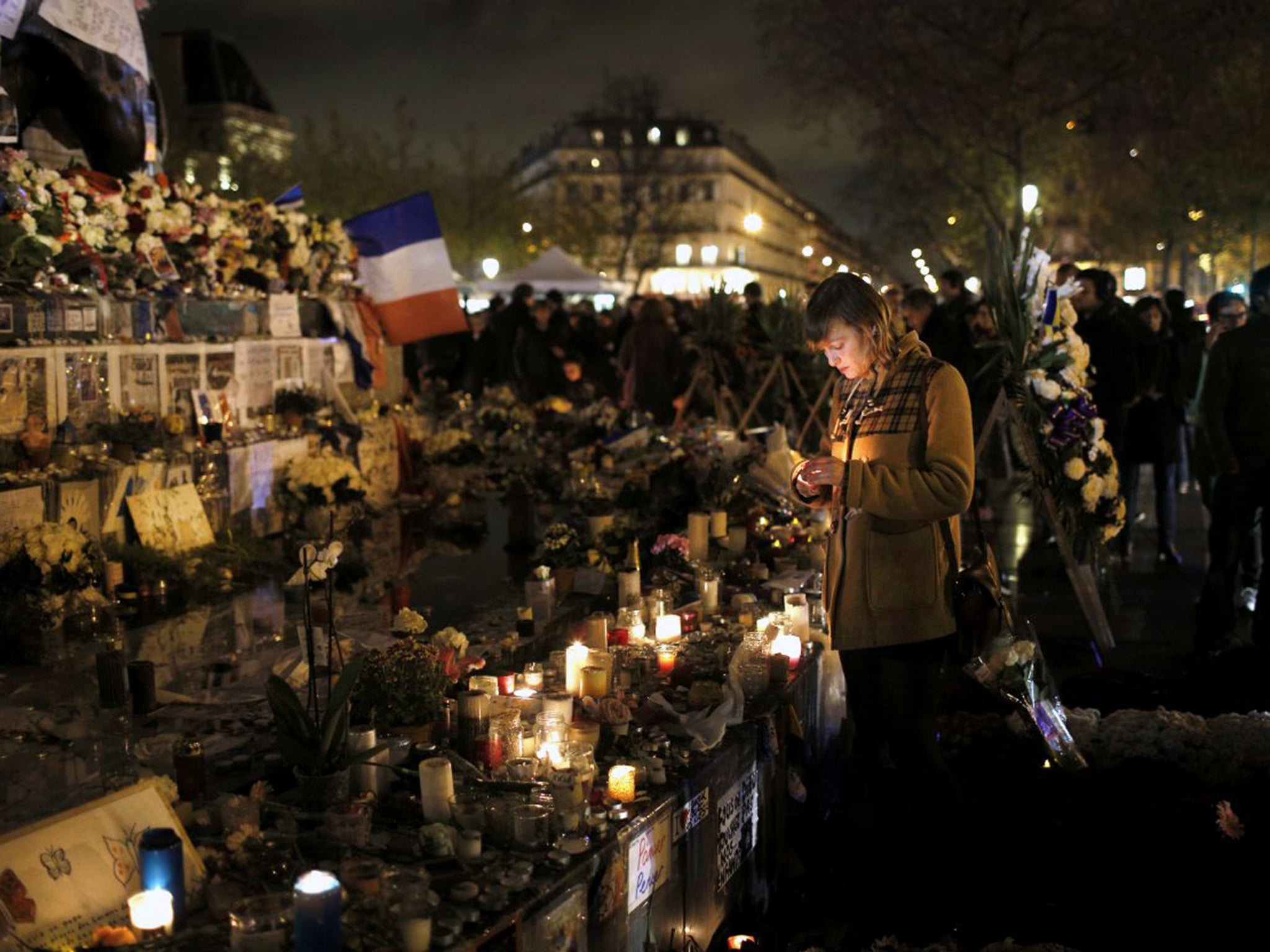Paris attacks: Residents speak of fear, blame and war as air of mourning pervades French capital
The Bataclan, La Belle Equipe, le Carillon – names once only associated with enjoyment have become memorials

One week on, the mourners still come. The Bataclan, La Belle Equipe, le Carillon – names once only associated with enjoyment and good company – have become memorials.
A steady procession of Parisians have arrived to lay flowers and candles – still in shock, but determined to try and understand the slaughter of 130 people in the heart of the City of Lights. In the 10th and 11th arrondisements – haunts of Paris’s young, diverse and open-minded – people remain caught between grief and defiance.
The glass frontages of the cafés and bars that were attacked still bear the wounds, and here and there roses have been thrust into holes made by bullets and shrapnel. Bouquets in red, white, blue, yellow and green festoon the pavement – visible scars on familiar Parisian scenes.
“Everyone has a friend who has a friend who was there,” says Mathieu Muls, 31, an engineer, who lives close to the Comptoir Voltaire, where one week ago Ibrahim Abdeslam sat down, ordered a drink, and then blew himself up. “The overwhelming feeling still is sadness. All week we have had to work, but it has been very hard. We have talked because we needed to. It makes us sad but we have no choice but to talk, and to think about it.”
On Friday night, as Paris prepared to mark the start of the attacks with a defiant show of light and music organised by local artists, there were the first hints that some semblance of normality might soon return.
Though quiet, the streets of the 10th and 11th were not only walked by mourners. In the spirit of the week’s defiant “Je Suis en Terrasse” protests, many were out drinking, and eating in the brasseries and bistros that make people fall in love with this city, the unaccustomed sound of laughter could sporadically be heard.
For Virginie Niclasse, a 35-year-old actress handing out flyers for the Laurette Theatre, which neighbours Le Petit Cambodge and Le Carillon, where 15 were killed – the events of last week could almost belong to another world.
“I stayed at my friends that night, and the next day we left early and got the Metro. The atmosphere was so strange and it was very, very shocking to see a military truck full of young soldiers unloading with their packs. It was like being in a war.
“It will never be like before,” she says. “People are forcing themselves to come back to normal life. People who say they are not afraid are afraid. We are all afraid.”
Casey Sellarole, a 27-year-old waitress from North Carolina, started working only three weeks ago at Le Pure Café, across the road from La Belle Equipe, where 19 people were shot last Friday.
“I think people are still on edge, which they have a right to be,” she says. “For me, the most scary part is that we all feel so powerless. The targets were random terraces. It’s targeting French culture.”
One word looms heavy over the city, first uttered by President François Hollande the day after the attacks, and now on most people’s minds: la guerre – war.
“I agree with Hollande, it is a war,” says Pierre Calixte, a 60-year-old from Seine Saint-Denis, just outside the city, who has come to pay homage at La Belle Equipe.
“The suspected ringleader who was killed came to France without anybody knowing. It’s necessary to revisit questions of the movement of people in Europe, the borders, absolutely. We have to close the external borders of Europe and protect the borders of France.”
Others resist such a hardening of attitudes. “It is not a war against another country,” says Mr Muls. “Closing the border is not the solution and I do not see a link between the refugee crisis and what happened. People who made the attacks were from France and Belgium. It is a war against an ideology. Closing the borders will not be a solution.”

In the suburb of Saint-Denis, where the suspected ringleader, Abdelhamid Abaaoud, was killed in a dramatic police raid on Wednesday – people are equally wary of any bellicose rhetoric.
“We are with the police. Hollande and they moved quickly,” says Mahmoud Bouazizi, whose family owns Les Orangines café, within sight of the rue du Corbillon, where police are still clearing the bombed out apartment.
“But in my opinion it’s not a war. Or at least not a war against un adversaire connu – a known enemy.”
For me, the most scary part is that we all feel so powerless. The targets were random terraces. It’s targeting French culture
Some commentators have begun to wonder whether the President’s uncharacteristically belligerent response – a three-month state of emergency and a renewed assault on so-called Islamic State (IS) strongholds in Syria – has as much to do with the political threat of Marine Le Pen and the far-right Front National, as it does with France’s security priorities.
For the young people of Paris, however, the first priority is clear – to overcome fear.
On Friday night at 9.20, precisely a week after the attacks began, a small crowd gathered at the foot of the statue of Marianne, the embodiment of liberty, in Place de la Republique which has become a temporary shrine to the fallen.
Romain Berger, a performance artist, has brought a sound-system and is acting as MC for an impromptu rave – a two-fingered salute to the joyless killers who left this place deserted a week ago. The crowd chant “Debout, debout!” – ‘stand up, stand up!”
“I’m proud of Paris,” he says “and this is the only just reaction: no words of hate, just stand together. Stand firm.”
Join our commenting forum
Join thought-provoking conversations, follow other Independent readers and see their replies
Comments